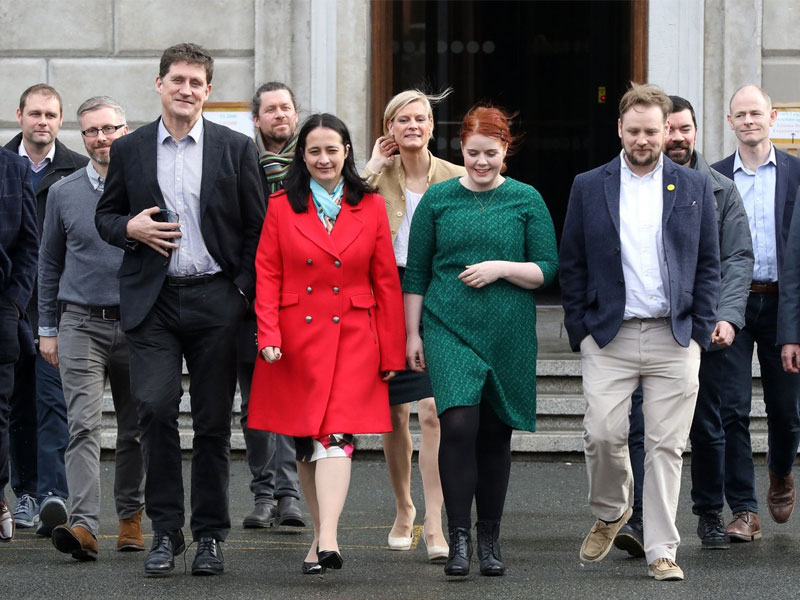The Young Greens and the Green Party are from different centuries. The Green Party membership has shown itself to be open to the neoliberal approach to politics, provided that they get carbon-reducing measures. The Young Greens are a modern, youthful force that will not accept the current way of doing things and argue tirelessly for climate and social justice to be implemented together. One of the green movement’s rallying cries is “there’s no climate justice without social justice and there’s no social justice without climate justice”. This cry went unheeded by the vast majority of the Green party membership, who voted to go into government with the centre-right.
When I resigned as chairperson of the Young Greens near the end of October, membership was in freefall. The Young Green National Committee voted to take a two-month break from political campaigning at the beginning of November, citing falling membership, the negative impact government has had on the remaining members and the need to find purpose within the Green Party and the wider green movement. This is unprecedented in their history and speaks to the disillusionment Young Greens, even those with the loudest voices, have been feeling.
The writing was on the wall when the Green Party voted to go into government. The Young Greens voted overwhelmingly against accepting the programme for government and the Green Party voted overwhelmingly to accept it. This shows that there is an irreconcilable disagreement on the fundamentals between Young Greens and old Greens.
On paper, the Young Greens agreed with most of the Green Party’s written policy. There were always disagreements, but the Young Greens had the power to help to write and shape policy along with the Green Party.
This shows that there is an irreconcilable disagreement on the fundamentals between Young Greens and old Greens
When a staggering amount of Green Party policy was disregarded during negotiations and a thoroughly neoliberal programme for government was drafted, the Young Greens came out against it in force, reminding the Greens that they were considering a coalition with the two parties that had been in government since the foundation of the State and that had refused to take climate change seriously, not to mention the plethora of other issues that were dear to the Party’s hearts.
They begged the Green membership not to tarnish the movement of climate and social justice, as well as climate action in the eyes of the Irish people, by following a neoliberal model and giving in on everything else to get greenways, cycle lanes and, hopefully, a commitment to a net-zero society by 2050, twenty years after it’s needed.
All of the Young Green branches voted to reject the programme for government citing many reasons, perhaps the main one being that you cannot have climate justice without social justice and vice versa. Over three-quarters of the Rural Young Greens voted against going into government and raised serious concerns about the youth of this country and rural Ireland under the neoliberal climate action model. A key concern for many was that the carbon tax that was going to be introduced was regressive and hurt those who were least well off, as well as rural dwellers without access to public transport.
All of the Young Green branches voted to reject the programme for government citing many reasons, perhaps the main one being that you cannot have climate justice without social justice and vice versa
When the Greens went into government, all the Young Greens’ worst fears were realised. The regressive carbon tax model was implemented, the Climate Bill was lacklustre and full of holes and, on top of all the issues with the climate end of government, the Green Parliamentary Party began to vote against the very pillars of the Green movement.
The Global Greens follow six guiding principles: ecological wisdom, social justice, participatory democracy, nonviolence, sustainability and respect for diversity. Looking at the actions of the current Green Party in government, it is clear to see that these are being thrown out the window in favour of one thing: neoliberal climate action.
The Young Greens warned the party that this would happen. Instead of listening to the warnings of those who helped to elect them, elected representatives and the wider party membership attacked the Young Greens as “idealistic”, “radical” and “naïve”. We were told that we did not understand politics, that we couldn’t give up this chance and that we needed climate action now, not during the next Dáil term. Our retort was that no one disputed needing climate action now, except Fianna Fáil and Fine Gael. Furthermore, we could not vote against all development on the issues that are part of the green movement for a chance of success in one area. When the Greens went into government and we continued to speak out against it, we were belittled, gaslit, attacked by elected representatives on Twitter, ignored and bullied until I, for one, couldn’t take any more.
I believe that it is now time for the Young Greens to leave. Supporting a party which refuses to practise what they preach is a waste of time and we don’t have the luxury of time anymore. We have until 2030, at the latest, to become a net-zero carbon society and this is not going to happen while the Greens are in government with the centre-right. Leave them and show them how much they have betrayed their ideals. Get involved in direct action. Shout, strike and show people that we are running out of time to implement a new way of doing things. This, or be complicit in a Green Party that kills people and the planet.
Tara Nic Giolla Seanáin is a former chairperson of the Young Greens.







